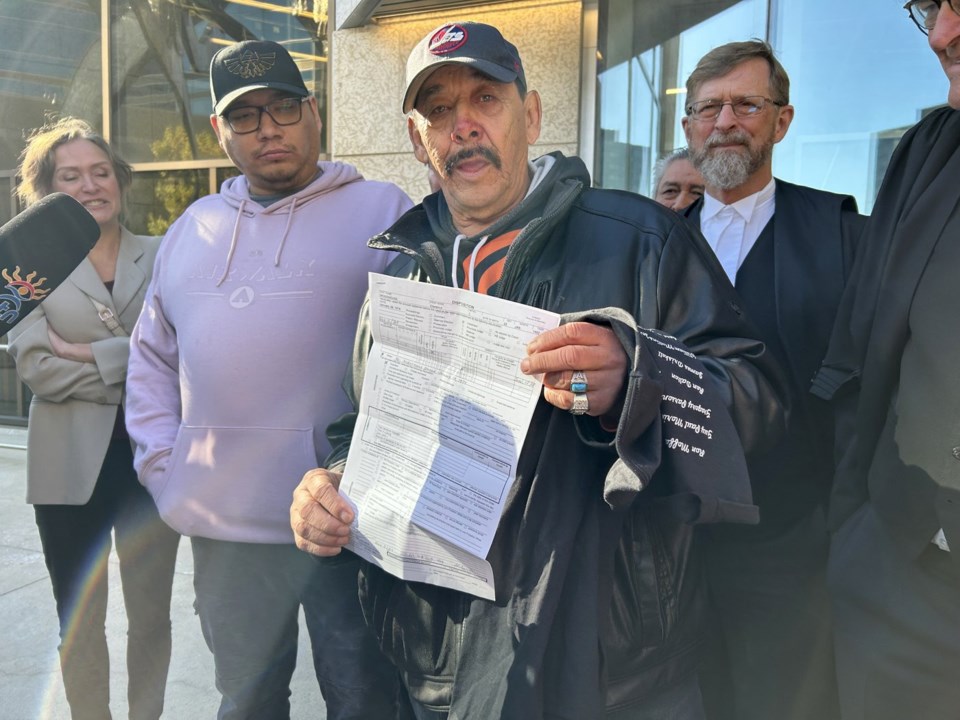WINNIPEG — An Indigenous man convicted of killing a restaurant worker 50 years ago was acquitted Thursday by a judge who called the case a wrongful conviction that involved systemic discrimination.
Clarence Woodhouse, 72, held up his court papers, along with a T-shirt that said "Innocent," outside court. He told reporters he is looking forward to spending time with his son and grandchildren.
"I'll probably just relax," Woodhouse said in a quiet voice.
Woodhouse is the third man to be exonerated in the 1973 death of Ting Fong Chan, a chef who was beaten and stabbed near a downtown construction site. Brian Anderson and Allan Woodhouse were acquitted last year.
The federal justice minister ordered a review of their case as likely miscarriages of justice. Their 1974 convictions were based largely on statements given to police that were fluent in English, including what prosecutors called a signed confession by Anderson.
The men's lawyers argued that the statements to police were not legitimate. Clarence Woodhouse and Anderson were not fluent in English and spoke Salteaux as a first language.
A Crown attorney told court Thursday that police coerced and manufactured the statement from Woodhouse, whose limited English was evident at trial. He was not provided an interpreter.
"Our justice system failed to provide Mr. Woodhouse and his co-accused a fair trial," Michele Jules said.
Chief Justice Glenn Joyal of the Court of King's Bench apologized on behalf of the justice system to Woodhouse, who spent more than a decade behind bars before being released on parole.
"There's nothing I can say to you that can give you back those 12 years," Joyal said.
"You were wrongfully convicted. You were innocent."
Joyal spoke at length about past wrongdoings of the justice system and efforts being made to move toward "judicial reconciliation."
Anderson served almost 11 years and was given full parole in 1987. Allan Woodhouse served 23 years. The two are suing three levels of government, saying their imprisonment was the result of racial discrimination.
A fourth man — Russell Woodhouse, Clarence Woodhouse's brother — was also convicted. He died in 2011.
James Lockyer, a lawyer and director with Innocence Canada, which has represented all three men, has said there needs to be an examination of homicide convictions involving Indigenous people over the last five decades in Manitoba.
Jerome Kennedy, another lawyer with the group, said outside court Thursday that Innocence Canada is also working on cases involving Indigenous men in Alberta, Saskatchewan and Ontario that are moving toward a request for a review by the federal justice minister.
He said he'd like to see a national effort, led by the federal government, to take on wrongful convictions and reach out to people behind bars.
“There appears to be a deeper systemic issue that requires a targeted approach,” Kennedy said.
"Statistically, we know that with the disproportionate number of Indigenous people in jail that there has to be wrongful convictions. Oftentimes, these people don't know who to reach out to or how to reach out."
Later Thursday, Woodhouse met with Manitoba Premier Wab Kinew at the legislature.
"I think the main thing we want to get across is to apologize and say we're sorry," Kinew said.
The Winnipeg Police Service acknowledged the decision Thursday and said its policies and practices have changed.
"Videotaping suspect and witness statements for major and serious crimes is now commonplace, the identification process now includes dedicated forensic investigators, advancements have been made in the collection of accurate evidence, and all police personnel are required to undergo mandatory bias-free and culturally based education and training," the service said in a press release.
"Along with evolving case law and legislative amendments, we will continue our efforts to address systemic issues in policing to help prevent wrongful convictions and uphold the integrity of the justice system."
This report by The 91Ô´´ Press was first published Oct. 3, 2024.
Steve Lambert, The 91Ô´´ Press



